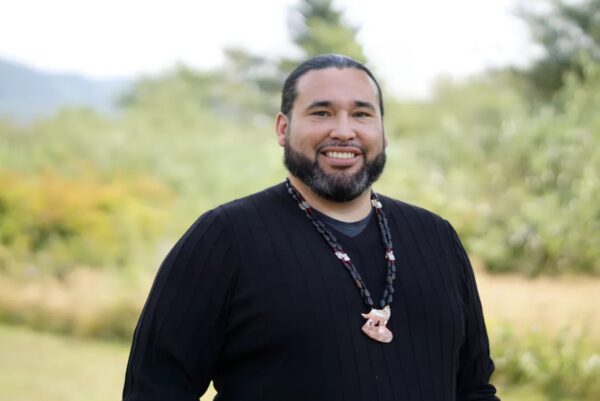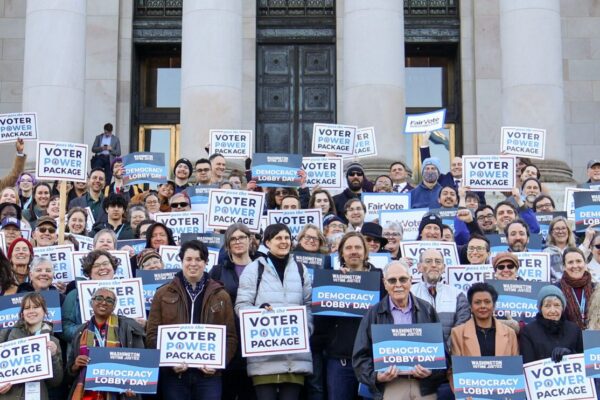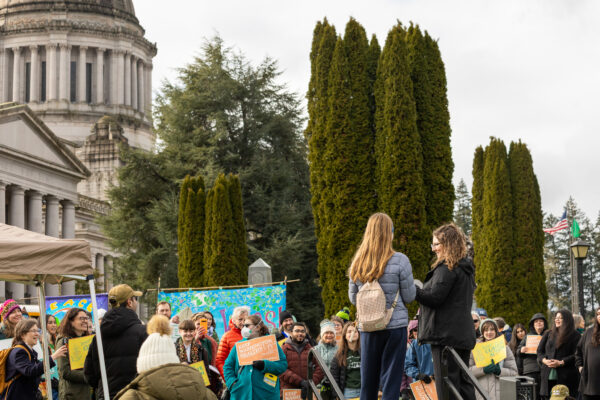In observance of Indigenous Peoples Day, we are sharing this story from our Winter 2022 issue of Convene. Read the full magazine here.
Tribal Nations Program Cultivates Listening
We live in noisy times in which everyone seems to be jockeying to be heard. In all our efforts to be heard, we sometimes forget that we must also listen.
Speaking and listening are twinned endeavors. You need both for understanding.
In July 2023, Washington Conservation Action launched the Tribal Nations Program to strengthen our relationships with tribal nations throughout Washington State, 29 of which are federally recognized. In the spirit of free, prior, informed consent (FPIC), this means building mutual understanding with these sovereign nations, each with their own governance structures, each with their own treaty rights, concerns, and hopes. WCA wants to explore how we might work together, build partnerships, and try to heal our wounded planet.
So far, a big part of this work has been listening. And why is this important? Historically, large environmental organizations have been led by white people, most of them men. And when established groups have involved Native peoples—whether the environmental establishment, the state or federal government, or other institutions—it often has been an afterthought. They’ve told Indigenous people what they need, rather than taking the time to learn first about challenges and opportunities that they face in their nations.
Tribal Nations must be included as we all craft solutions to the climate crisis, pollution, and other environmental issues. As we work to move beyond consultation to consent, we welcome members to take a look at these resources for additional information:
Learn more at:
goia.wa.gov or bit.ly/UNFPIC
We have much to learn from Indigenous peoples. Since time immemorial, Native people have managed to meet their needs while maintaining a balance with nature. As European culture has become dominant on the continent, it has pushed ecosystems to the brink in just a few centuries. Despite all this, Indigenous peoples have maintained traditions that center nature, such as the First Salmon Ceremony in which many Salish peoples give thanks for the return of the spawning fish that have sustained them for millennia. Indigenous practices emphasize listening, not only to people, but to wildlife, to seas and streams, to forests, commonly referred to as “relatives.
As WCA’s Tribal Nations Director, Jody Olney is preparing the ground for this new initiative in an ancient way. Jody is a citizen of the Muscogee Creek Nation, and is of Karuk, Nez Perce and Yakama descent. Growing up, she spent summers and her high school years on the homelands of the Confederated Tribes and Bands of the Yakama Nation in south-central Washington, the lands of her father and grandfather. She remembers fishing for trout, picking huckleberries, and camping with her family in the mountains of the Tribe’s land.
“The way my elders taught was really subtle, they showed us by example,” she says. “There was an expectation that you would listen, that you would not be brash. If you’re saying things, it should be from a place of knowledge or genuine curiosity.”
Jody earned a BA and a law degree from University of Washington, focusing on environmental law and federal Indian law. “I served on a couple of diversity committees, because the academic environment felt subtly hostile. Students of col[1]or didn’t always feel supported or welcome and they’d opt to transfer. The committee work was a way to create space for these discussions among students. It was impactful for me to realize peo[1]ple could go their entire lives knowing nothing about tribal sovereignty. It’s been a part of my life for as long as I can remember.”
“Another time, a law classmate asked, ‘If there was one thing I could do for Indigenous people, what would that be?’ And I said, ‘There isn’t just one thing, it’s interrelated, it’s systemic and by design. It can be jarring for folks hearing the history – even from a legal perspective – for the first time.”
Jody went on to work as legislative assistant for the late-state Sen. John McCoy (Tulalip), and then with urban Indian organizations in Seattle, where she worked on housing issues and service programs. Jody is now working to organize a three-part series to help other non-governmental organizations looking to build working relationships and engage in meaningful collaborations with Tribal Nations to understand this work is fundamentally different. She’s meeting with tribal leaders. She’s attending conferences brought together by the Affiliated Tribes of Northwest Indians (ATNI) and the Governor’s Office of Indian Affairs (GOIA).
We’re trying to interact in a new way
Jody Olney
“As I’m trying to establish this new role, I find myself often thinking of my time working with state Sen. McCoy. His agenda was built collaboratively, based on what he heard.”
Active listening like that is central to many Indigenous cultures. Most Tribal Nations passed on culture through oral tradition. In that sort of environment, people had to develop listening and memory skills in order to pass on cosmology, history, and knowledge. As Indigenous peoples were forced from their ancestral lands onto reservations, these oral traditions, this craft of speaking and listening, became an essential method of remaining connected to each other, and to their stolen homelands.
The Tlingit of southeast Alaska traditionally did not speak immediately when entering a neighbor’s village or home. Instead, both newcomer and host would sit quietly for a while, listening to each other’s body language, just being. Once the time seemed right, one would speak out loud.
When faced with a conflict or a problem, many First Nations developed the tradition of a talking circle, in which people gather in a circle and then pass around a ritual object like a feather, a shell. While one speaker holds that object, everyone in the circle is called to listen. The closest Western analog to this is a debate, with back and forth, a “winner” and a “loser.” In contrast, talking circles make the focus connection and community. The point is not victory, but sharing, reflecting, and learning.
As she works to build deeper bonds between WCA and Washington’s Tribal Nations, Jody is focusing on those goals. She says leaders have been largely receptive, “They say, ‘This is the right way, not just having an initiative, but talking and listening.’”
For instance, at the Affiliated Tribes gathering in September 2022, Jody decided to simply be present, listening with respect. That contrasts with the dominant culture’s need to be linear, to always have a list and a deliverable.
“You can learn a lot about somebody by just letting them occupy the same space as you, without framing what you want them to do. I could pull them out of meetings, or interrupt their lunch, but that doesn’t honor what they’re doing there. I see the value in sitting with people and their priorities, learning just by being. The open-endedness is part of the challenge, but also part of the point,” Jody explains. “One of the hardest things is to be open-ended, to go in with curiosity. To connect folks where that makes sense. To not come in where it doesn’t make sense. To say, ‘This is what we’re doing. Are there parts of that that connect with what you’re doing?”
###
So much gratitude goes to our CEO Alyssa Macy who began her career at Washington Conservation Action with the goal of bringing the conservation and environmental community together with Tribal Nations to bring truly lasting impact and environmental justice to our state. She knew that our future depended on respect and collaboration.
Then in 2021, and for more than a year, Macy worked with partners, Tribal leaders, and environmental leaders to design a first of its kind, three-part learning series entitled, “Building Effective Partnerships Between Environmental Groups & Tribal Nations.”
In late 2022 and early 2023, Alyssa’s dream materialized. The series was held for WCA board and staff, as well as 300 individuals representing staff from various statewide environmental organizations. They brought leaders from Tribal Nations and Native-affiliated organizations to increase the conservation community’s foundational knowledge of Native history, civil rights, Indigenous land management, and environmental movements. This series is aimed at encouraging conservation organizations to learn and develop respectful, effective partnerships with tribes and Native organizations. There will be more trainings and opportunities in the future to engage each other on this important work. Stay tuned.
Your donation ensures a sustainable future.


